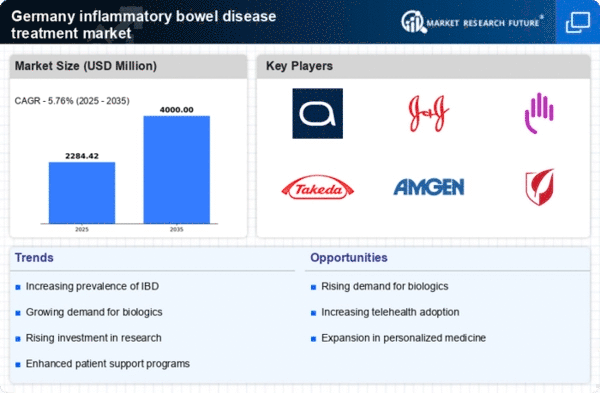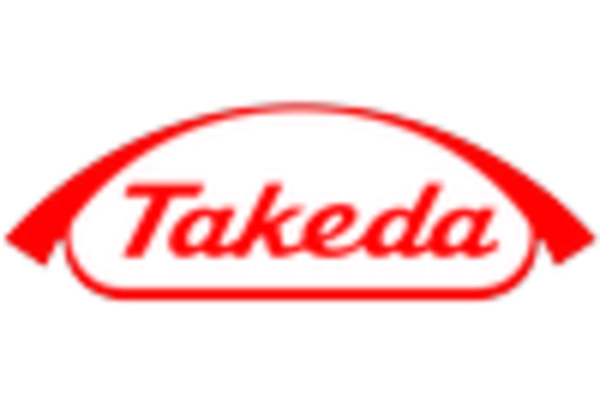Advancements in Pharmaceutical Research
Innovations in pharmaceutical research are significantly influencing the inflammatory bowel disease treatment market. The development of new therapeutic agents, including biologics and small molecules, has transformed treatment paradigms. In Germany, the approval of novel medications has expanded treatment options, allowing for more tailored approaches to patient care. The market is witnessing a surge in clinical trials, with over 100 ongoing studies focused on IBD therapies. This research not only enhances understanding of disease mechanisms but also fosters the introduction of more effective treatments. As pharmaceutical companies invest heavily in R&D, the potential for breakthrough therapies could reshape the landscape of the inflammatory bowel-disease-treatment market, offering hope for improved patient outcomes.
Rising Awareness and Education Programs
The increasing awareness of inflammatory bowel disease among healthcare professionals and the general public is a significant driver for the inflammatory bowel disease treatment market. Educational programs and campaigns aimed at both patients and providers are being implemented across Germany. These initiatives focus on early diagnosis and effective management of IBD, which can lead to improved patient outcomes. As awareness grows, more individuals are likely to seek treatment, thereby increasing market demand. Furthermore, healthcare providers are becoming more adept at recognizing symptoms and recommending appropriate therapies. This heightened awareness is expected to contribute to the expansion of the inflammatory bowel-disease-treatment market, as more patients are diagnosed and treated effectively.
Government Initiatives and Healthcare Policies
Government initiatives and healthcare policies play a pivotal role in shaping the inflammatory bowel disease treatment market. In Germany, the healthcare system emphasizes access to innovative treatments and patient-centered care. Recent policy changes aim to streamline the approval process for new therapies, facilitating quicker access for patients. Additionally, reimbursement frameworks are evolving to support the use of advanced treatments, including biologics. The German Federal Ministry of Health has allocated substantial funding for research and development in IBD, which is expected to enhance treatment accessibility. These initiatives not only promote the growth of the inflammatory bowel-disease-treatment market but also ensure that patients receive timely and effective care.
Technological Innovations in Treatment Delivery
Technological advancements in treatment delivery systems are reshaping the inflammatory bowel disease treatment market. Innovations such as telemedicine, mobile health applications, and remote monitoring tools are enhancing patient engagement and adherence to treatment regimens. In Germany, the integration of these technologies into clinical practice is becoming increasingly common, allowing for more personalized care. Patients can now access healthcare professionals remotely, facilitating timely interventions and reducing hospital visits. This shift not only improves patient satisfaction but also has the potential to lower healthcare costs. As technology continues to evolve, it is likely to play a crucial role in the future of the inflammatory bowel-disease-treatment market, driving growth and improving patient outcomes.
Increasing Prevalence of Inflammatory Bowel Disease
The rising incidence of inflammatory bowel disease (IBD) in Germany is a crucial driver for the inflammatory bowel disease treatment market. Recent studies indicate that approximately 0.5-1% of the population is affected by IBD, with a notable increase in cases over the past decade. This growing patient population necessitates the development and availability of effective treatment options. As awareness of IBD increases, more individuals seek medical attention, leading to higher demand for therapies. The market is projected to expand as healthcare providers focus on innovative treatments to manage this chronic condition. Furthermore, the economic burden associated with IBD, estimated at €5,000-€10,000 per patient annually, underscores the need for effective management strategies, thereby driving investment in the inflammatory bowel-disease-treatment market.
















